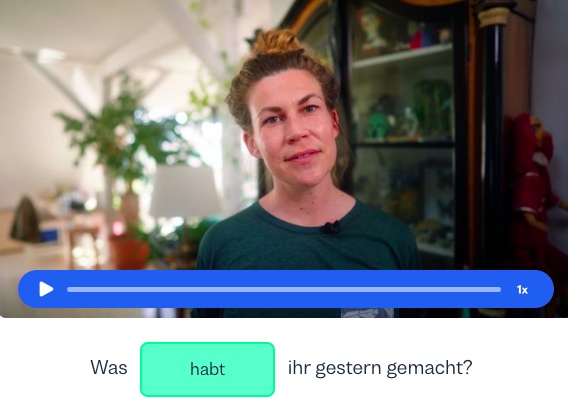A Guide to German Verb Conjugation
Learn the different verb examples and tenses in German, plus how to use them.
I want to learn...
A verb is a word that describes physical action, mental action or a state of being. Knowing how to change German verbs correctly (to conjugate them) to make them fit into a sentence is an important part of German grammar. In a nutshell: A German sentence is not a sentence without a verb.
To help you learn German verbs, we’ll introduce you to regular and irregular verbs, the present tense, perfect tense, and past participles. To start, we’ll focus on basic, present-tense German verb conjugation.
German verb conjugation – present tense
Before we dive into the Präsens (present tense) of German verbs, we first need to understand that all verbs have a stem (which is the part that basically remains the same), plus an ending.
Verbs in German change their appearance by removing the ending from the infinitive (the basic form as you can find it in the dictionary)—this is how you get the stem—and replacing it with a new ending that matches both the tense (present, past, etc.) and the pronoun (I, we, they, etc.) of the subject (person or thing doing the action of the verb).
German verbs: Present tense of wohnen (to live) and arbeiten (to work)
| Wohnen stem: Wohn- | Arbeiten stem: Arbeit- |
|---|---|
| ich wohne | ich arbeite |
| du wohnst (you live) | du arbeitest* |
| er/sie/es wohnt | er/sie/es arbeitet* |
| wir wohnen | wir arbeiten |
| ihr wohnt | ihr arbeitet* |
| sie/Sie wohnen | sie/Sie arbeiten |
*Since the stem of arbeiten already ends on t, with du, er/sie/es and ihr, we avoid a pronounciation problem by adding an e.
The verb forms for male, female, and neuter pronouns—er (he, for male persons and masculine words), sie (she, for female persons and feminine words), and es (it, for neuter words)—all have the same ending: -t. Here are some example sentences:
- Manfred kommt aus Stuttgart. (Manfred comes from Stuttgart.)
- Melissa studiert in Berlin. (Melissa studies in Berlin.)
- Dieses Sauerkraut schmeckt gut. (This sauerkraut is tasty.)
The ihr (you, informal, plural) form of the verb is conjugated like the er/sie/es (he, she, it) form with the ending -t, but note that that’s not always the case as ihr forms have many exceptions:
- Ihr kommt aus Stuttgart. (Y´all come from Stuttgart.)
Fortunately for us, the wir (we) and the sie (they) forms do not change. So, they look exactly like the basic form:
- Wir lernen Deutsch. (We learn German.)
- Sie lernen Deutsch. (They learn German.)
- Wir wohnen in Stuttgart. (We live in Stuttgart.)
- Sie arbeiten in Stuttgart. (You (formal) work in Stuttgart.)
Exceptions for conjugating German verbs
Of course, there are exceptions to the rules. (Earlier, we have already seen the exception* with arbeiten.) For the verb reisen (to travel), the stem is reis- and already ends on -s. We don’t want to double the s; as a result, we are omitting the -s on the ending for du:
Conjugation of reisen (to travel)
| Pronoun | Stem: reis- |
|---|---|
| ich | reise |
| du | reist |
| er/sie/es | reist |
| wir | reisen |
| ihr | reist |
| sie/Sie | reisen |
This goes for all verbs with stems that end in -s, -ß and -z. More examples include kreisen (to circle), schließen (to close) and duzen (to be on first-name terms, to address someone informally).
German verb conjugation – past tenses
German has three different tenses to describe events in the past: the Präteritum (past tense or “simple past”) is widely used in written language, for example, in books and articles. It is also used with the stand-alone verbs haben and sein and with the modal verbs. But you’ll hear the Perfekt (perfect tense) mostly used in conversation. When referring to something that happened before something else has happened, the Plusquamperfekt (past perfect tense) is used. As you can imagine, the latter occurs not that often in spoken German.
To help you get started in conversational German, we’ll focus on the Perfekt, which is the most common past tense used in spoken German.
When to use the Perfekt
We use the Perfekt in spoken language when we talk about an action that is finished but still relevant for the speakers as they are talking.
How to form the Perfekt
This tense is formed by using the verbs haben (to have) or sein (to be) as helpers (auxiliary verbs) and a form of the main verb called the Partizip II (past participle). To help you picture this better, think about it in English when we say, “I have eaten.” or “He is gone.” In these cases, “have” and “is” are the auxiliary verbs, and “eaten” and “gone” are the past participles.
Two aspects are relevant when forming the Perfekt:
- Which auxiliary verb do we need? haben or sein?
- How do we form the past participle? (usually with ge- before the stem, but there are exceptions we will cover below), and with the endings -t for regular verbs; -en for irregular verbs. There may also occur stem changes; more on that below)
Here are some example sentences with the auxiliary verbs haben and sein:
- Ich habe am Montag gearbeitet. (I worked on Monday.)
- Er ist nach Italien gefahren. (He traveled to Italy.)
- Wir sind ins Theater gegangen. (We went to the theater.)
- Ich bin geschwommen. (I swam.)
- Wir sind geflogen. (We flew/took a flight.)
Tips:
- When using the Perfekt, the helper verb forms change to match the subject while the Partizip II does not – it is 100% unchangeable.
- If you have already learned the past participles of English irregular verbs you can almost 100% count on it that their German counterparts are irregular, too. At least you should use this knowledge to make educated guesses.
- haben as a helper verb happens more often than sein in the Perfekt. So, if you cannot decide, try haben.
And of course: The infamous German sentence frame
It’s also good to know that in German, the Partizip II is usually placed at the end of a sentence.
- Gestern habe ich einen Film gesehen. (I saw a film yesterday.)
- Thomas hat gestern Mathe gelernt. (Thomas revised his math yesterday.)
- Wann bist du nach Hause gekommen? (When did you get home?)
More on using haben and sein
Many verbs taking haben create the Partizip II like this: ge____t, with the stem of the verb filling the gap, e. g., lernen (to learn) -> gelernt, machen (to make) -> gemacht.
Verbs that use the auxiliary verb sein in the Perfekt refer to movement or a change of situation, and the Partizip II of verbs taking sein usually looks like this: ge____en.
Typical verbs that use sein for the Perfekt
The following words all express movement or a change of situation:
- gehen (to go)
- fahren (to drive)
- kommen (to come)
- aufwachen (to wake up)
- losfahren (to set off)
- ankommen (to arrive)
Separable verbs vs. non-separable verbs with haben and sein
As in English, some German verbs have prefixes in front of the stem (e.g., compare dress vs. undress with anziehen vs. ausziehen). Unlike English, however, some of these prefixes can be separated from their stem for conjugation purposes or may appear somewhere else by themselves. Think of them like wagons on a cargo train that can be rearranged as needed. The most common separable prefixes are: ab-, an-, auf-, aus-, bei-, ein-, her-, hin-, mit-, nach-, vor-, weg-, and zu-. The most common non-separable prefixes are: be-, emp-, ent-, er-, ge-, miss-, ver-, wider-, and zer-.
Many separable verbs taking haben create the Partizip II like this: _ge__t._
Separable verbs :
- einkaufen (to shop) > Ich habe eingekauft. (I shopped.)
- einschlafen (to fall asleep) > Ich bin eingeschlafen. (I fell asleep.)
- losfahren (to set off (by vehicle)) > Ich bin losgefahren. (I set off [by vehicle].)
- ankommen (to arrive) > Ich bin angekommen. (I arrived.)
- aufstehen (to get up): Ich bin aufgestanden. (I got up.)
- fernsehen (to watch TV): Ich habe ferngesehen. (I watched TV.)
The Partizip II of verbs with non-separable prefixes and of verbs that end in -ieren is formed without the ge- prefix, such as:
- bezahlen (to pay up): Ich habe bezahlt. (I paid up.)
- studieren (to study): Ich habe studiert. (I studied.)
- verstehen (to understand): Ich habe verstanden. (I understood.)
That being said, there are quite a few verbs in German whose form in the Partizip II is way different from their basic form.
Let’s have a look at a few:
- bringen (to bring): Ich habe Brötchen gebracht. (I brought bread rolls.)
- gehen (to go): Ich bin ins Theater gegangen. (I went to the theater.)
- nehmen (to take): Ich habe den Zug genommen. (I took the train.)
The past tense of haben and sein (main verbs) and of modal verbs
Interestingly, the verbs haben (to have), sein (to be) when standing on their own as well as modal verbs like wollen are rarely used in their Perfekt form. Instead, we usually use the Präteritum (past tense):
- Ich war in Köln. (instead of: Ich bin in Köln gewesen. – I was in Cologne.)
- Ich hatte Fieber. (instead of: Ich habe Fieber gehabt. – I had a fever.)
- Ich wollte einen Kaffee. (instead of: Ich habe einen Kaffee gewollt. – I wanted a coffee.)
German verbs in infinitive clauses
When you are familiar with English on, let`s say, level B1, you already know this kind of structure:
- I`m going to the supermarket to buy some milk.
As English and German are both Germanic languages, German offers you this possibility, too:
- Ich gehe in den Supermarkt, um Milch zu kaufen.
These infinitive clauses are pretty common and easy to build, as long as you remember to always put the zu + infinitive (basic form) at the end of the structure.
The basics of German verbs
While it may seem like a lot, you now have a great foundation for using and studying verbs in German. We covered how to conjugate basic and irregular verbs in the present tense and introduced you to the past tense, specifically the Perfekt with Partzip II.
You’re well on your way to mastering German verbs and with practice, you’ll be using them confidently in no time. Keep your momentum going today with our tips for learning German at home.
Keep practicing German verbs with Busuu!
German verbs are tricky, but Busuu has your back. Keep practicing your German with our free online language courses today.

